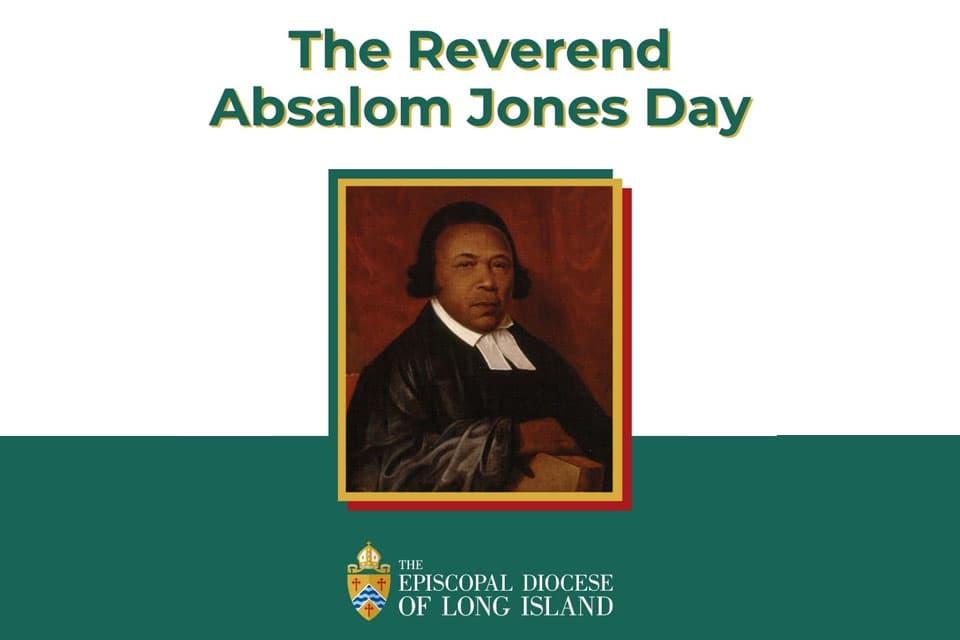
The Episcopal Diocese of Long Island and the Black Clergy Caucus presented the 2023 celebration of The Reverend Absalom Jones Day, on Saturday, February 11, 2023, at the Cathedral of the Incarnation. Rev. Absalom Jones was the first person of African descent ordained a priest in the United States. The Right Reverend Lawrence C. Provenzano, Bishop of the Diocese of Long Island, precided. The Reverend Landon Moore, Priest in Charge at St. George’s in Brooklyn, preached the sermon.
Video Presentation
View the Full Live Stream
A Brief History of the Rev. Absalom Jones for Young People
Presented by: the Rev. Marjorie Boyden-Edmonds
Originally produced for All Saints, Bayside, by: Teddy Byrne
Photos from the Celebration
Photography by Jen Uihlein, Girl in a Camera Productions
To see full album, click here!
Resources for Anti-Racism and Racial Justice in the Diocese of Long Island and Beyond
- Uncovering Parish Histories - An Antiracism Project
- Barbara C. Harris Scholars Program for Truth and Reparations
- Sacred Ground
- Beloved Journey
The Life and Ministry of the Rev. Absalom Jones
Absalom Jones was born enslaved to Abraham Wynkoop, a wealthy Anglican planter, in 1746 in Delaware. He was working in the fields when Abraham recognized that he was an intelligent child and ordered that he be trained to work in the house. Absalom eagerly accepted instruction in reading and saved the money he was given to buy books. Abraham Wynkoop died in 1753. When Absalom was sixteen, Abraham’s son Benjamin Wynkoop sold the plantation and Absalom’s mother, sister, and five brothers. He brought Absalom to Philadelphia where he opened a store and joined St. Peter’s Church.
With the permission of their masters, Absalom married Mary Thomas who was enslaved to Sarah King who also worshipped at St. Peter’s. Absalom and his father-in-law, John Thomas, used their savings, and sought donations and loans primarily from prominent Quakers, in order to purchase Mary’s freedom. They saved enough money to buy property and to buy Absalom’s freedom. After repeated requests, Benjamin Wynkoop freed Jones by granting him a manumission.
Absalom began worshipping at St. George’s Methodist Episcopal Church. He met Richard Allen who had been engaged to preach at St. George’s and the two became lifelong friends. Together, in 1787, they founded the Free African Society, a mutual aid benevolent organization that was the first of its kind organized by and for Black people. At St. George’s, Absalom and Richard served as lay ministers for the Black membership. The Black members worked hard to help raise money to build an upstairs gallery intended to enlarge the church. The church Intercessorship decided to segregate the Black worshippers in the gallery, without notifying them. During a Sunday morning service, a dispute arose over the seats Black members had been instructed to take in the gallery, and ushers attempted to physically remove them by first accosting Absalom Jones. Most of the Black members indignantly walked out in protest.
In 1792 the Free African Society began to build the African Church of Philadelphia. The church membership took a vote and decided to affiliate with the Episcopal Church. Absalom Jones was asked to provide pastoral Intercessorship and after prayer and reflection he accepted the call. The African Church was dedicated on July 17, 1794. Soon thereafter the congregation applied for membership in the Episcopal Diocese of Pennsylvania on the following conditions: 1) that they be received as an organized body; 2) that they have control over their own local affairs; 3) that Absalom Jones be licensed as lay reader, and, if qualified, be ordained as a priest. In October 1794 it was admitted as the African Episcopal Church of St. Thomas. Bishop William White ordained Jones as deacon in 1795 and as priest on September 21, 1802.
Jones was an earnest preacher. He denounced slavery and warned the oppressors to “clean their hands of slaves.” To him, God always acted on “behalf of the oppressed and distressed.” St. Thomas Church grew to over 500 members during its first year. Known as “the Black Bishop of the Episcopal Church,” Jones was an example of persistent faith in God and in the Church as God’s instrument. Jones died on February 13, 1818.


